
Rhodolite Garnet Gem: Properties, Meaning & Price Guide
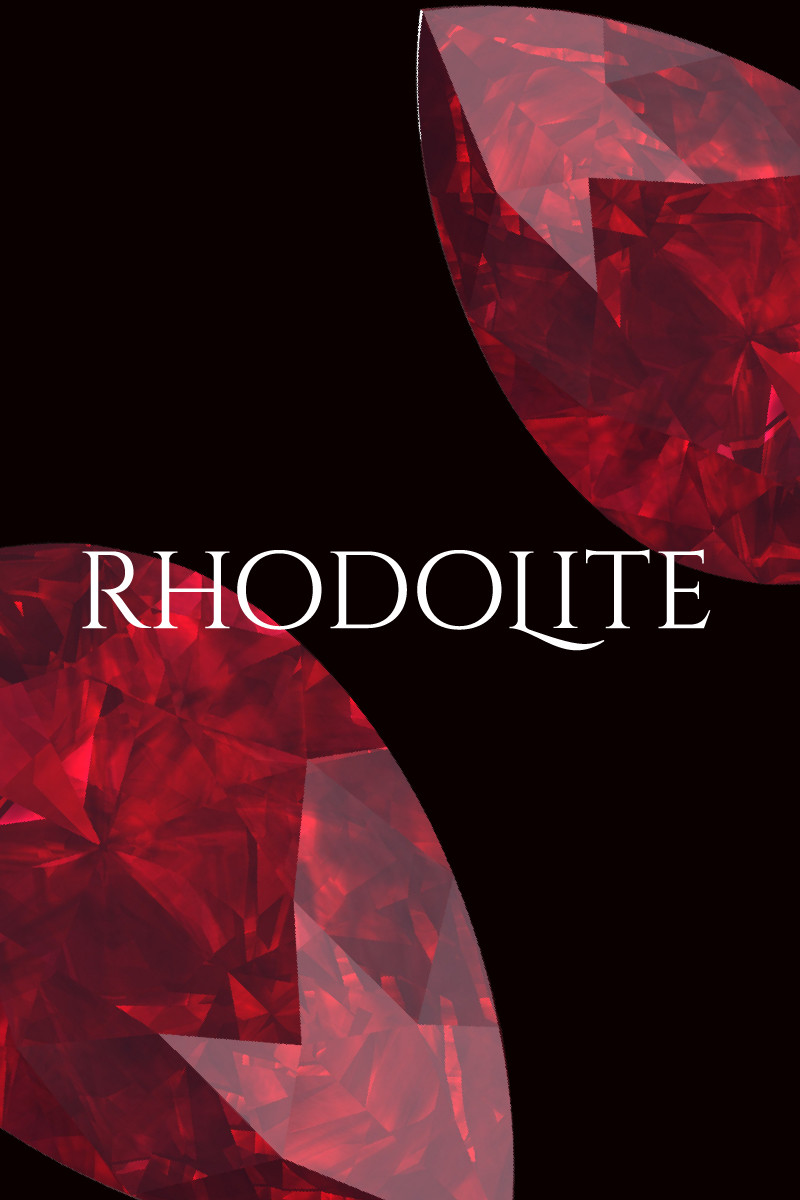 Rhodolite is a pink to reddish-purple garnet gemstone variety. Is rhodolite garnet a natural stone? It is! Rhodolite’s gorgeous hues, be it raspberry, plum, or wine, are all created by nature.
Rhodolite is a pink to reddish-purple garnet gemstone variety. Is rhodolite garnet a natural stone? It is! Rhodolite’s gorgeous hues, be it raspberry, plum, or wine, are all created by nature.
Among garnets, rhodolite is distinguished for its lighter, more purple color and wider variety of sources. Among gemstones in general, rhodolite stands out for its high refractive index — meaning fantastic sparkle — and rich, romantic colors.
But is rhodolite garnet a good stone? We’d say so, but you’ll be able to say for yourself by the end of this guide.
Today, we’ll go over all of rhodolite garnet’s properties, healing powers, history, prices, and more.
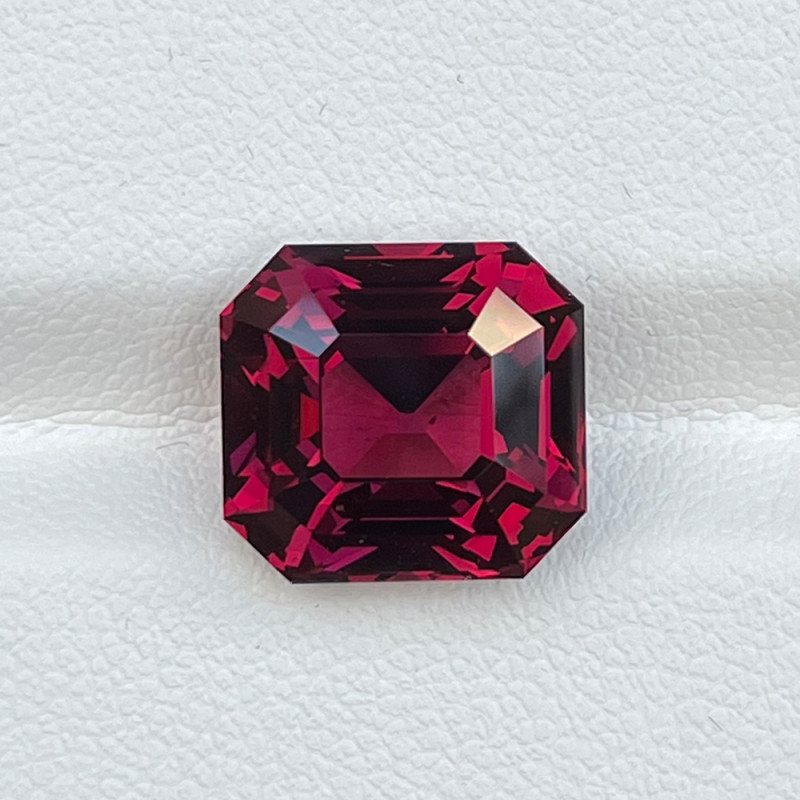
About Rhodolite Garnet Stone
Rhodolite garnet is a semi-precious gemstone, though it often resembles the precious gemstone ruby. In fact, some of rhodolite's nicknames include:
Arizona Ruby
Montana Ruby
New Mexico Ruby
Of course, rhodolite and ruby are different stones.
The main differences between rhodolite garnet vs. ruby are their composition, hardness, price, and rarity. Ruby is a corundum gemstone that ranks at 9 on the Mohs mineral hardness scale, higher than rhodolite. Ruby is also rarer and more expensive than rhodolite.
Since rhodolite is less pricey, it makes an affordable substitute to ruby as the traditional July birthstone. Individually, rhodolite is a January birthstone, Capricorn or Aquarius, zodiac stone, and 2nd wedding anniversary gem, like all garnets.
Regarding common mix-ups, rhodolite is often confused with rhodonite. Rhodonite is an opaque, rose-red manganese inosilicate gem commonly found with black to brown veining or spots.
 Pictured above: Faceted red rhodolite garnet earrings
Pictured above: Faceted red rhodolite garnet earrings
Rhodolite Specifications & Characteristics
The garnet mineral group has a complex family tree. The main series are pyralspite — pyrope, almandine, and spessartite — and ugrandite — uvarovite, grossular, and andradite. Each species has its own varieties, though many varieties are hybrids.
Rhodolite is a hybrid of pyrope and almandine, leading to the nickname “pyrandine.” The stone’s formula is (Fe,Mg)3Al2Si3O12.
Traditionally, rhodolite was believed to be 1 part almandine and 2 parts pyrope. Modern gemology sources list the ratio as 3 parts almandine to 7 parts pyrope.
Nevertheless, traces of other species like spessartite and grossular are common in rhodolites, and the pyrope-almandine ratio may vary among different rhodolites.
You may be able to distinguish rhodolite from similar-looking gems with a magnet, as rhodolite garnet is strongly to very strongly magnetic.
Here are the remaining rhodolite properties:
Mohs hardness: 7-7.5
Color: Light to dark shades between pink, red, and purple including lavender pink, raspberry, red, purplish-violet, purplish-red, reddish-purple, violet, red
Crystal structure: Cubic/isometric
Luster: Vitreous (glassy)
Transparency: Translucent to transparent
Refractive index: 1.745-1.795 (Some ranges vary by source; Tanzania = 1.745-1.760; North Carolina, USA = 1.760-1.761; Zimbabwe = 1.750-1.760)
Density: 3.74-3.94 (Some ranges vary by source; Tanzania = 3.79-3.80; North Carolina, USA = 3.84-3.89; Zimbabwe = 3.83-3.89)
Cleavage: None; Sometimes indistinct parting
Fracture: Conchoidal
Streak: White
Luminescence: None
Pleochroism: None
Optical effects: Rarely asterism; Rarely color-changing
Dispersion: 0.026
Though rhodolite is a variety in itself, it also has some subtypes.
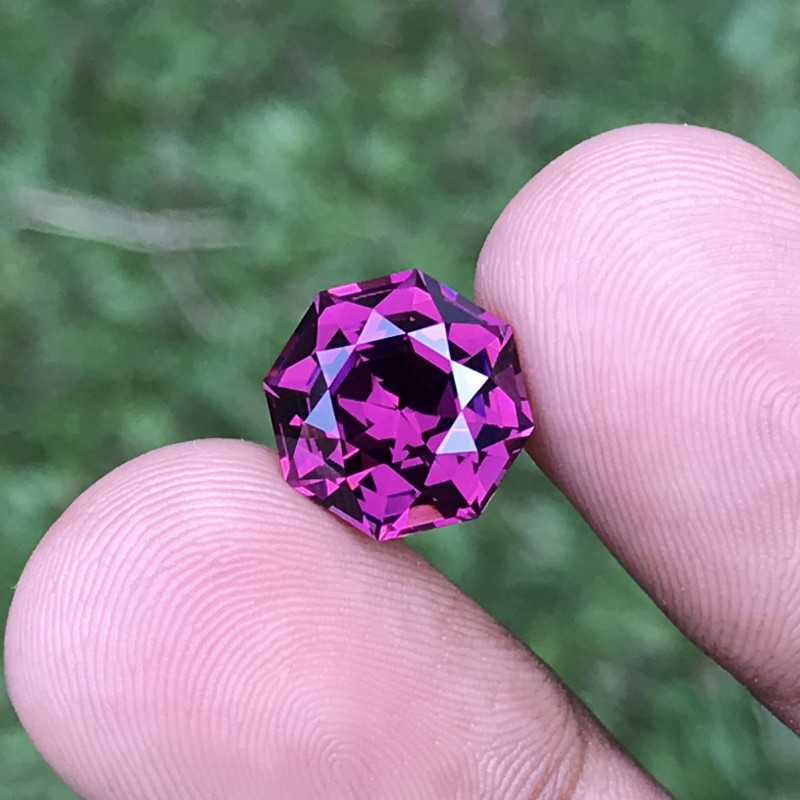 Pictured above: Grape garnet
Pictured above: Grape garnet
Types of Rhodolite
The first rhodolite subtype is grape garnet, which has a deep purple hue from traces of iron and magnesium.
Next, we have Umbalite garnet.
Sourced from the Umba River Valley in Tanzania, Umbalite garnet is a pinkish-red, purple-pink, or purplish-red rhodolite with brighter coloring than most rhodolites. Some call this high-quality subtype the “The King of Rhodolite.”
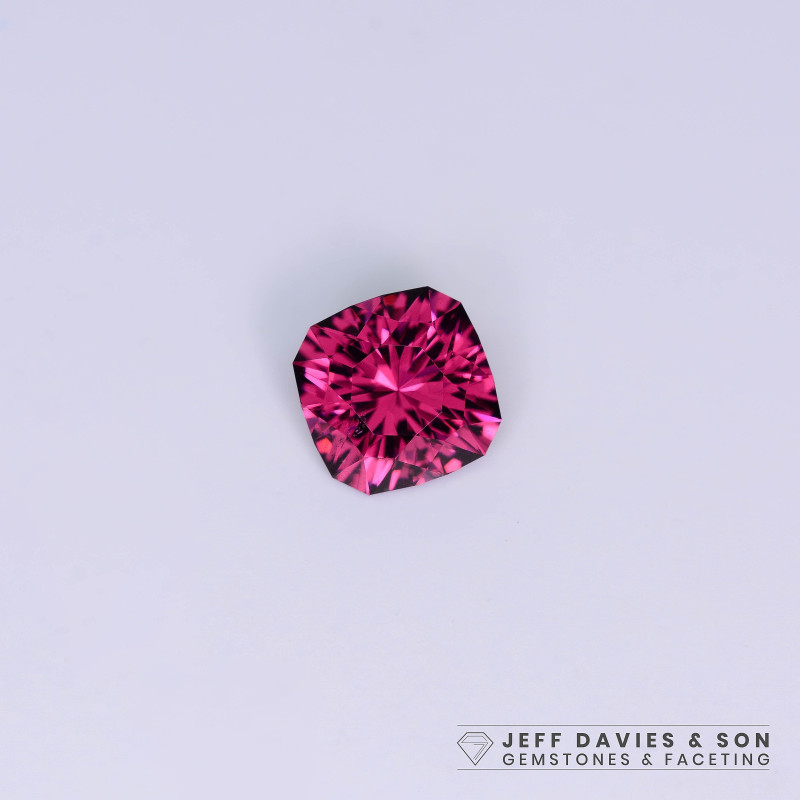 Pictured above: Umbalite garnet
Pictured above: Umbalite garnet
Moving into optical-effect subtypes, let’s start with color-changing rhodolite.
Many garnets can be color-changing , including rhodolite. Color-changing rhodolites appear blue in daylight and purplish-red under incandescent lighting.
Last, we have star rhodolite garnet.
This subtype displays asterism, an optical effect where you’ll see a multi-rayed reflection of light on the surface, creating a star shape. The star may have 4 or 6 rays, with some specimens showing both 4- and 6-rayed reflections from different angles. Asterism is rare for rhodolites, though.
 Pictured above: Rhodolite garnet carved into Chinese dragon
Pictured above: Rhodolite garnet carved into Chinese dragon
Rhodolite Garnet Meaning & History
Rhodolite symbolizes love, empathy, and generosity. As a 2nd anniversary gem, this garnet represents an undying flame of love for couples.
You may know that garnet is one of the first known gemstones, dating back centuries. That amount of history has lended many interpretations of rhodolite garnet’s spiritual meaning.
Historically, garnets represented light (both spiritually and literally), life, and protection. Today, rhodolite holds similar meanings, representing friendship, commitment, and passion.
History
Rhodolite is a more modern find. American mineralogist William Earl Hidden first heard about a new garnet in North Carolina, USA, from reports by local mineralogist A.M. Field in 1893 and 1897.
Field believed the stones were an almandine variety. Hidden and his colleague Dr. J.H. Pratt analyzed the stones and published their findings in 1898, proposing the name “rhodolite” and confirming the composition was a pyrope-almandine hybrid instead.
Rhodolite’s name likely comes from the Greek rhodon, meaning “rose” or “rose-colored.” Some theorize that the name instead comes from the rhododendron flower, which resembles rhodolite in color.
It’s important to note that the term “rhodolite” isn’t an official mineralogical name. Rather, it’s a popular trade name that has stuck for marketing pyrope-almandine garnets.
Rhodolite Variety Discoveries
In 1978, Tanzania miners made the first discovery of Umbalite garnet in the Umba River Valley.
Color-changing garnets found in Tanzania’s Morogoro region in 1988 were thought to be rhodolites for years, but later analysis proved they were actually a pyrope-spessartite hybrid.
Shifting from history to healing, what is rhodolite good for?
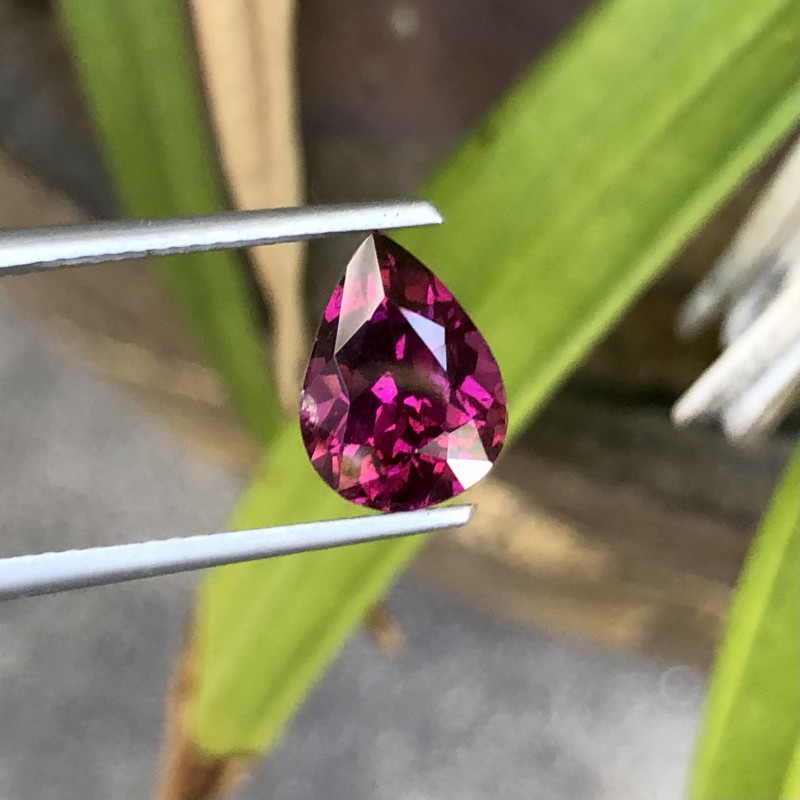 Pictured above: Faceted rhodolite garnet with pear shape
Pictured above: Faceted rhodolite garnet with pear shape
Rhodolite Healing Properties
Like all crystals, rhodolite can function as a healing stone.
Red rhodolite, like other red gemstones, boost strength, passion, and courage. Purple rhodolites like grape garnet join other purple gems in promoting spiritual wisdom and self-awareness. Meanwhile, pink stones like raspberry rhodolite encourage unconditional love of yourself and others.
Physical Healing
Crystal healers recommend rhodolite for treating:
Heart problems
Lung problems
Hemorrhages
Hip issues
Poor blood circulation
Emotional Healing
Emotionally, rhodolite stone benefits anyone who has gone through trauma. It’s said to help you heal from guilt, negative memories, and self-doubt.
For those in relationships, rhodolite is believed to enhance intimacy, turn up the romance, and prevent resentment or jealousy.
Chakra Healing
Rhodolite is a chakra stone for the root, heart, and crown chakras. By harmonizing these three chakras, rhodolite brings you a combination of stability, emotional awareness, and spiritual ascension.
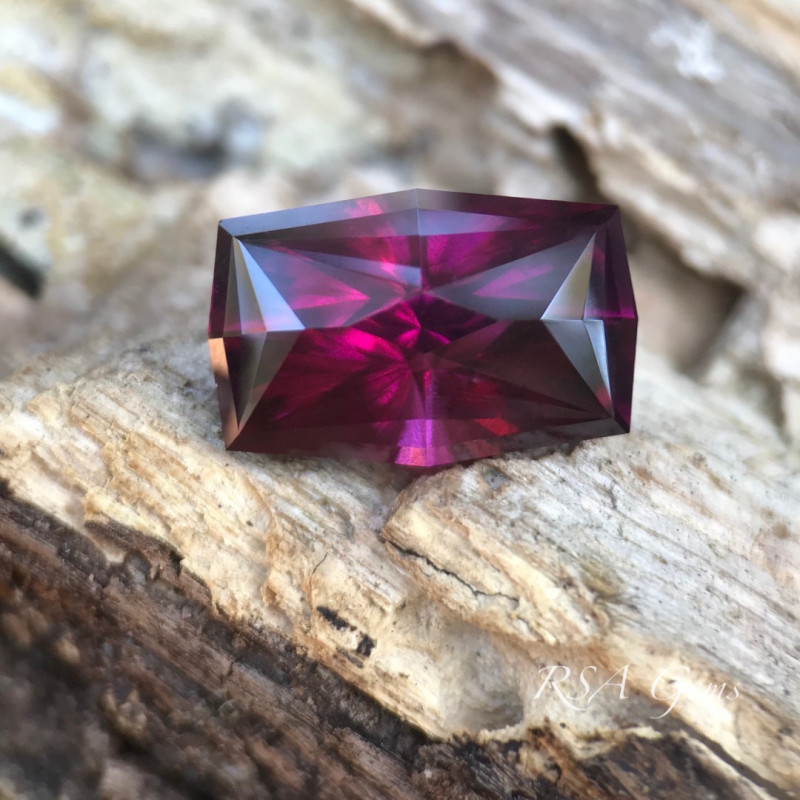 Pictured above: Faceted purple rhodolite garnet
Pictured above: Faceted purple rhodolite garnet
Rhodolite Gemstone Properties
The value of rhodolite is based on its color, cut, clarity, and carat weight. We’ll also discuss treatments and synthetics.
Color
Rhodolite garnet color ranges from pink to red to purple, with various shades in between, conjuring comparisons to amethyst and ruby.
Rhodolite’s red is typically lighter than other, too-dark red garnets. However, it’s better known for its raspberry and purplish-red colors.
For grape garnets, pure purple hues are more valuable than redder hues.
Other impurities that can affect rhodolite’s color are vanadium and chromium. Higher amounts of spessartite in the composition can lighten the color. High heat can also change the color, but we’ll discuss that more in the Treatments section.
Cut
Most rhodolites available on the jewelry market are faceted, which helps bring out their excellent sparkle (a.k.a. brilliance). Round, pear, and oval shapes are most common, but you’ll also see various fancy cuts like the StarBrite™ cut or “Rhodolite Rose” cut.
Jewelers may also cut rhodolites into cabochons. Specimens displaying asterism must be cut as cabochons to properly show the effect. Rhodolites may be cut into carvings or beads as well.
 Pictured above: Rhodolite garnet ring with accent diamonds
Pictured above: Rhodolite garnet ring with accent diamonds
Clarity
Rhodolites typically have great clarity, with a Type II colored gemstone clarity grade, meaning few to no visible inclusions the naked eye. Under magnification, you’ll see small crystal inclusions in many rhodolites.
Specific possible inclusions include:
Needle-like rutile crystals
Zircon crystals with stain “halos”
Some inclusions produce optical effects, like fibrous bunches of rutile inclusions behind star rhodolite’s asterism.
Carat Weight
Rhodolites can be found in huge sizes, but the size varies by source. North Carolina rhodolite gems are only 1-2 carats, while African rhodolite gems can be 75+ carats.
The largest known star rhodolite garnet is a 15.6-carat cabochon from Kangala Mine, Tanzania. Among the largest faceted rhodolites is a 86.4-carat gem, also from Tanzania.
In terms of cost, price-per-carat rates increase for faceted rhodolites under 1 carat, from 1-10 carats, and over 10 carats.
Treatments
Rhodolites are very rarely treated, but experiments have been done. In 1997, heat made rhodolites brownish-red or orange and left a metallic coating. Further tests have shown that heating rhodolites to 600°C (1112°F) makes them change from purple to brown (resembling hessonite) in an irreversible process.
Pyrope-almandine garnets treated to have a metallic coating used to be sold as “Proteus garnets.” They were named after the shape-shifting Greek sea god, Proteus, because they had a dark, metallic luster (resembling hematite) in reflected light but a dark red appearance in transmitted light.
Synthetics & Simulants
Synthetic rhodolites have been created via hydrothermal growth for research. Some may show up in the gem market, but this is uncommon.
You may see rhodolite simulants — similar-looking stones with different chemical properties — sold as “synthetic rhodolite.”
Common rhodolite simulants are cubic zirconia or colored glass.
Back to nature, how does rhodolite form?
 Pictured above: Rough rhodolite garnet crystal
Pictured above: Rough rhodolite garnet crystal
Rhodolite Formation & Sources
Rhodolite forms like most garnets. High-aluminum sedimentary rocks undergo metamorphism via heat and pressure, altering the minerals inside into new minerals like rhodolite.
Almandine garnets are found in metamorphic rocks like mica schists or igneous rocks like pegmatites. Pyrope garnets are similarly found in igneous rocks like kimberlite.
Geographically, where is rhodolite found?
Mining Locations
The best sources for finding rhodolite gemstone material are Brazil, India, Madagascar, Sri Lanka, Tanzania, and Zimbabwe.
North Carolina, USA is a notable source for rhodolites with specific density and refractive index measurements, but produces much fewer rhodolites now than in the past.
Additional important sources for gem-quality rhodolites are:
Afghanistan
Austria
Canada
China
Ethiopia
Kenya
Mozambique
Myanmar
Norway
Russia
USA (Alaska)
Umbalite garnets come from the eponymous Umba River Valley in Tanzania. Tanzania is also home to color-changing rhodolites, specifically from the North Pare Mountains.
Meanwhile, East Africa (including Tanzania) is where many star rhodolite garnets come from, while Brazil and India produce most grape garnets.
Sources aside, is rhodolite an expensive stone? We’ll discuss that next.
 Pictured above: Deep red rhodolite garnet pendant necklace
Pictured above: Deep red rhodolite garnet pendant necklace
Rhodolite Garnet Price & Value
Rhodolite can be pricey, but it’s more affordable than rubies or rarer garnets. Generally, the rhodolite garnet price per carat starts at $20 per carat and reaches roughly $300 per carat.
Here are the general prices for faceted rhodolites by carat weight:
0.5 to 1 carat: $20-$100 per carat
1 to 10 carats: $20-$150 per carat
10+ carats: $40-$300 per carat
Next are the prices for rhodolite cabochons by carat weight:
0.5 to 1 carat: $4-$6 per carat
1 to 10 carats: $5-$30 per carat
10+ carats: $5-$40 per carat
Rough rhodolite specimens are the least expensive, ranging from $0.70-$8 per carat at wholesale.
Rhodolite Care and Maintenance
Rhodolite’s durability and lack of cleavage makes gemstone care pretty simple. They’re durable enough for everyday wear, though you may want protective settings for a rhodolite garnet ring.
Hidden inclusions can be a risk, though. Extreme heat or ultrasound cleaners can make tiny inclusions burst, so avoid mechanical cleaning.
Instead, clean rhodolite with a soft toothbrush, mild soap, and lukewarm water. Store away from other gems.
 Pictured above: Silver bracelet with stacked, faceted brownish-red to reddish-purple rhodolite garnets
Pictured above: Silver bracelet with stacked, faceted brownish-red to reddish-purple rhodolite garnets
Ravished by Rhodolite?
Rhodolites are among the most popular garnets for good reason. These bright gems combine durability, sparkle, and sophisticated colors all for an accessible price.
Whether you’re looking for an affordable ruby alternative or timeless garnet variety, rhodolite is the perfect choice.
Search the Gemstone Encyclopedia
Related Auctions
Related Articles
Originally the Birthstones or gemstones were associated with a zodiac sign or the month of a individuals birth. Find out what your stone is and view the stones we have for sale
8th Feb 2021
There are dozens of quartz and chalcedony gems with various colors and patterns. Learn all about quartz properties and every type of quartz, from amethyst and agate to plasma and phantom quartz!
15th Oct 2020
Hackmanite is a pink to violet sodalite gem known for its unique color-change and luminescence. Learn why hackmanite is special, from its rare qualities to the types of hackmanite jewelry available.
28th Mar 2018
Latest Articles
Yugawaralite is a rare colorless, white, or pinkish zeolite crystal named for its discovery in Yugawara, Japan. Here we uncover the multifaceted history, properties, prices, and uses of yugawaralite.
24th Mar 2025
Simpsonite is a lesser-known mineral known on the gem market for its durability, yellow-orange color, and rarity. Discover all the properties, uses, prices, and history of simpsonite.
3rd Mar 2025
Kurnakovite is a colorless crystal related to inderite and rarely faceted but known among collectors. Explore the mineral traits, history, prices, and more in this kurnakovite guide.
17th Feb 2025
Article Categories
How To's is where you will find helpful articles from gem Rock Auctions on how to cut gemstones, select gemstones and buy gemstones.
9 Articles







